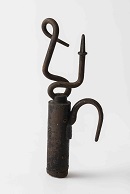Objects of Resistance: Early Global Material Cultures between Inclusion, Resilience and Refusal (1300-1600)
Workshop geleitet von Arndt Brendecke, Lucas Burkart und Stefania Gerevini. Mailand, Bocconi University
27.10.2017 – 28.10.2017

Several recent studies have explored the movement of objects across geographic and cultural boundaries and illuminated the complex dynamics of their reception. These studies have significantly enriched our understanding of local and global connections before modernity, the receptivity of early cultures, and the frequency of material exchanges between them. However, the transfer and circulation cannot be assumed to have worked in less complex ways than societies in general. As any interactive social process the movement of objects entailed a wide range of possibilities, including misunderstandings, contradictions failures and renegotiations. Such instances contributed to define acceptable protocols of interaction between different visual, linguistic or religious groups, and were therefore central to the ways in which pre-modern communities negotiated their identities and boundaries and redefined them over time.
Moving beyond binary oppositions between cultural openness and closure, or isolation and circulation, this workshop aims to explore the complex systems of values, conventions, and practices that underpinned cultural exchanges and the transfer of objects in the early global world from a broader perspective, including both scenarios of acceptance and rejection.
This entails a closer examination of the social, economic, artistic and cultural settings that enabled or impeded the transfer of objects and the analysis of a wide range of phenomena that include, but are not limited to:
the migration-segregation of certain social groups, particularly craftsmen or experts that embodied specific knowledge.
the temporary or permanent inclusion/exclusion of certain materials and classes of objects from regional or global networks of exchange, and its implications.
the approval-rejection of diplomatic gifts or donations, and relative protocols of acceptance or refusal.
the implementation of specific commercial and legal frameworks that facilitated or hindered exchange
the misnaming and reinterpretation of objects and how they illuminate the relationships between different religious linguistic or visual cultures.
Together, these examples confirm the power of objects to convey dense social and political meanings, the sensitivity of medieval and early modern communities to those messages, and the wide range of responses that were available to them. Shedding light on the methodological challenges and limitations of an object-oriented perspective of history in the first age of globalization, the workshop will contribute to current debates about material culture, the "life of things", the history of consumption, and early global networks of goods, people and knowledge.

